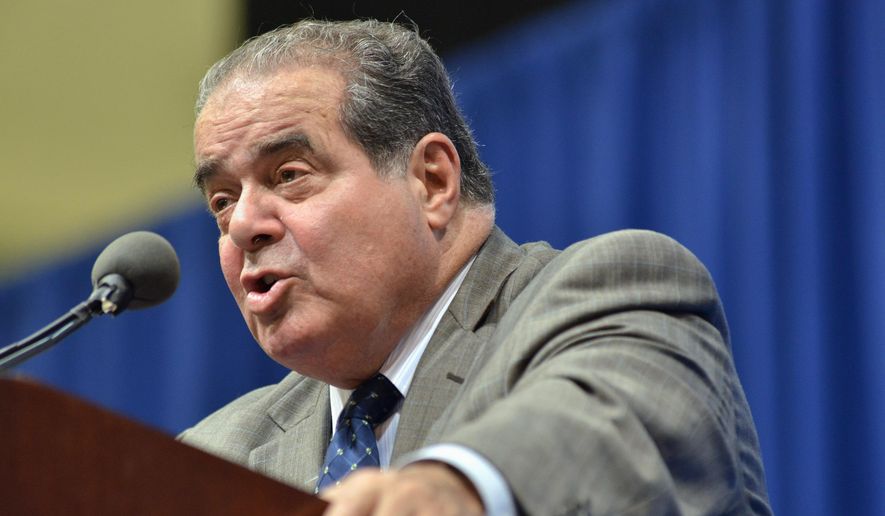Antonin Scalia disputed the notion that his Catholicism had anything to do with his interpretation of the Constitution, but Catholic scholars say the moral courage evident in the late Supreme Court justice’s approach to reading law is poignantly revealed in his faith.
A group of leading Catholics from across the country gathered in Washington, D.C., on Wednesday evening to honor the spiritual life of the intellectual giant. Scalia, who died in February, was posthumously awarded the John Paul II New Evangelization Award by the Catholic Information Center.
The jurist’s widow, Maureen Scalia, and son, Father Paul Scalia, accepted the award on his behalf.
The keynote address was delivered by Ed Whelan, a former Scalia law clerk who now heads the Ethics and Public Policy Center.
Drawing extensively from the justice’s writings on religion, Mr. Whelan said Scalia spurned the notion that he was somehow a “Catholic justice.”
“Understood that way, the label of ’Catholic justice’ is something that Justice Scalia emphatically rejected,” Mr. Whelan said. “As he put it: ’I don’t think there’s any such thing as a Catholic judge. There are good judges and bad judges. The only article of faith that plays any part in my judging is the commandment, Thou Shalt Not Lie.’ “
But prominent Princeton professor Robert George, who emceed the event, said Scalia did not do justice to the significance of his Catholic faith.
He said the devotion with which Scalia defended the Constitution found its earliest and deepest expression in his commitment to the church.
“No one in the nation, no one in the history of the nation, ever had greater fidelity to our Constitution and the principles of republican government than Antonin Scalia,” Mr. George said. “But his fidelity, I can’t help but think, was simply a kind of further development, a further expression, of that more profound fidelity that Nino had for Jesus Christ and to his church.”
That devotion was also evident in Scalia’s family life, enumerated by 55 years of marriage, nine children and 36 grandchildren as of this writing.
At the heart of Scalia’s spiritual, familial and intellectual fidelity was a quality he called “moral courage.”
He was fond of quoting C.S. Lewis’ “The Screwtape Letters,” in which courage is defined as “not simply one of the virtues, but the form of every virtue at its testing point, which means at the point of highest reality.”
Mr. Whelan cited a speech Scalia gave to a Junior ROTC Regiment at his alma mater, Xavier High School in Manhattan.
Scalia, who had been a member of the regiment in his youth, attempted to convey the lesson that practicing physical courage in defense of one’s country develops the moral courage necessary to a life of Christian virtue.
“By teaching physical courage in service of others, [the regiment] teaches moral courage — which, in the Last Accounting we must give, is the kind that matters,” Scalia said in the speech.
Scalia also understood that moral courage expresses itself differently based on different circumstances. While the soldier must be prepared to lay down his life in the service of others, moral courage for the layman “rarely requires the sacrifice of one’s life.”
The virtue found varied expression in Scalia’s own life.
Mr. George recalled the meekness with which the jurist called on Christians, against the grain of academia and popular culture, to be “fools for Christ.”
“You all remember him famously saying that we are called to be fools for Christ in a world that refuses to recognize the life of Christ, in a world in which sophisticated people believe faith is a foolish thing,” Mr. George said. “Well, then we will be in the eyes of the world fools for Christ. And gosh, that was so inspiring to me, and I’ll bet it was inspiring to you as well.”
The meek moral courage of Scalia’s faith stands in stark contrast to the vocal courage he summoned in defense of the Constitution. While he may have been a fool for Christ, Scalia was not one to suffer foolish arguments from the bench.
Scalia’s conception of moral courage contained multitudes, but it did not contradict itself. Mr. Whelan said Scalia saw faith and reason not as in conflict, but, in the words of Pope John Paul II, as “two wings on which the human spirit rises to the contemplation of truth.”
“As a jurist, Antonin Scalia was an apostle of textualism,” Mr. Whelan said. “As a man, he was a disciple of the Word. By his example and quiet counsel, he encouraged those of us who knew him to embrace our faith more deeply and to strive to live our own lives of moral courage and integrity.”
• Bradford Richardson can be reached at brichardson@washingtontimes.com.




Please read our comment policy before commenting.